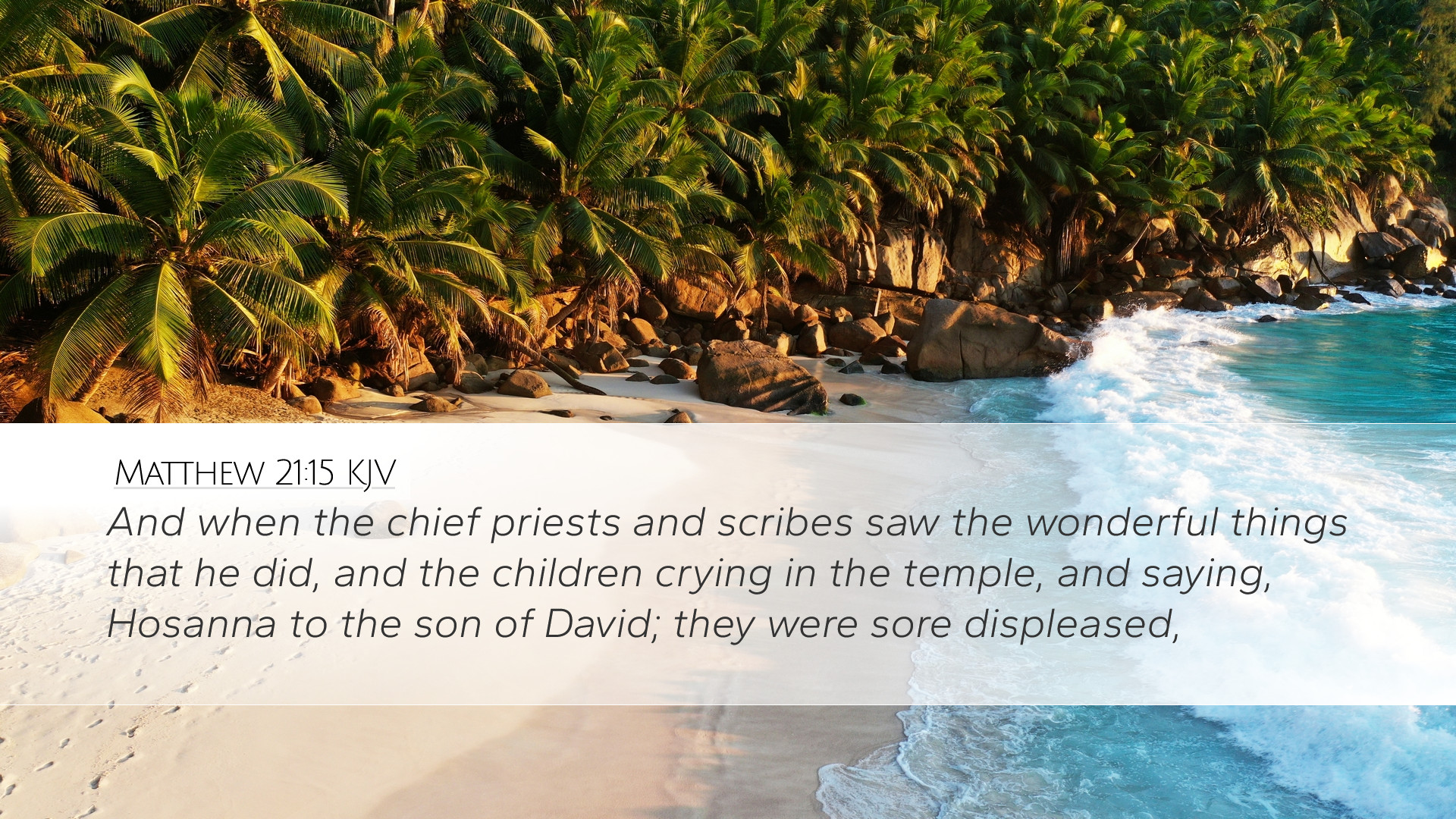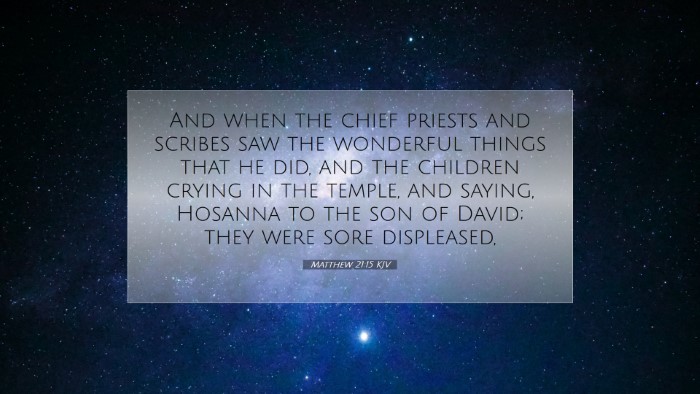Commentary on Matthew 21:15
Verse Context: Matthew 21:15 states, "But when the chief priests and the scribes saw the wonderful things that he did, and the children crying out in the temple, 'Hosanna to the Son of David!' they were indignant."
Overview
This verse occurs within the narrative of Jesus' triumphal entry into Jerusalem, which leads directly into His cleansing of the temple. Accompanied by miraculous works and the enthusiastic praise of children, this moment marks a significant confrontation between Jesus and the religious leaders of His time.
Insights from Matthew Henry
Matthew Henry emphasizes the contrast between Jesus' humble ministry and the opposition from the religious leaders. The children’s joyous proclamation serves as a legitimate acknowledgment of Jesus’ messianic identity, which the leaders actively reject. Henry views this as a revealing moment that uncovers the hardness of the hearts of the chief priests and scribes.
- Children as Witnesses: The children, uninhibited and pure in their praise, represent a significant contrast to the cynical religious elites. Henry notes that their recognition of Christ reflects a divine truth that the leaders refuse to accept.
- Indignation of Leaders: Henry highlights that the leaders’ indignation reveals their spiritual blindness. Their disdain towards the innocent worship is a reflection of their desire to maintain control and power over the people.
Insights from Albert Barnes
Albert Barnes provides an analytical look at the cultural and theological implications of the verse. He highlights that this moment in the temple serves as a confirmation of Jesus’ authority and a direct challenge to the religious authorities.
- Response of the Children: Barnes suggests that the children’s exclamations of "Hosanna" echo the prophetic acknowledgment of the Messiah found in Psalm 118:25-26. This prophetic fulfillment signifies that Jesus is indeed the expected one.
- Indignation as a Sign of Guilt: The chief priests' reaction indicates not merely annoyance but a sense of guilt, knowing their failure to recognize the true nature of Jesus and His mission. Their anger stems from their fear of losing authority over the people.
Insights from Adam Clarke
Adam Clarke offers a theological interpretation that connects the act of praise from the children with the overarching theme of Jesus' divine identity. His commentary discusses the significance of public adoration in contrast to the private jealousy of the leaders.
- The Manifestation of Christ’s Glory: Clarke posits that the miracles performed by Jesus serve to authenticate His claims. The children’s praises are not just spontaneous; they are responses to the manifest glory of God through Christ.
- Contrast of Innocence and Corruption: The juxtaposition between the innocent praise of children and the corrupt motives of the leaders serves to illustrate a profound spiritual truth; often, those who are expected to be the bearers of truth can be the very ones who oppose it.
Theological Reflections
Matthew 21:15 invites deeper theological reflections regarding childlike faith and the sincere, untainted worship that is often absent in adult religious practices. The children remind us that the Kingdom of God is characterized by humility and pure-hearted adoration.
Faith and Worship
The essence of this passage calls to question the nature of our own worship and the posture of our hearts before God. Are we, like the children, able to recognize Christ’s authority and respond in joyous praise, or have we been hardened by cynicism and doubt like the religious leaders?
Call to Accountability
This scene also serves as a reminder for leaders within the Church to guard against jealousy and bitterness toward the work of the Holy Spirit among others. The indignant response of the priests shows how easily one can be consumed by the desire for influence and authority, leading to a rejection of God’s work in unexpected places.
Conclusion
In summary, Matthew 21:15 encapsulates a pivotal moment of recognition of Jesus' messiahship and highlights the profound implications of genuine worship. Amidst opposition, the unfettered praise of the children stands as a witness to Christ's true identity and mission. This passage challenges readers — pastors, scholars, and laypersons alike — to reflect on their own responses to Jesus. Are we aligned with the humble praises of children, or do we risk falling into the patterns of the chief priests?
"Let us strive for a faith that is as childlike as it is thoughtful, embracing the joyous adoration that the children exemplified, while remaining aware of the pitfalls of pride and indifference that the religious leaders displayed."


